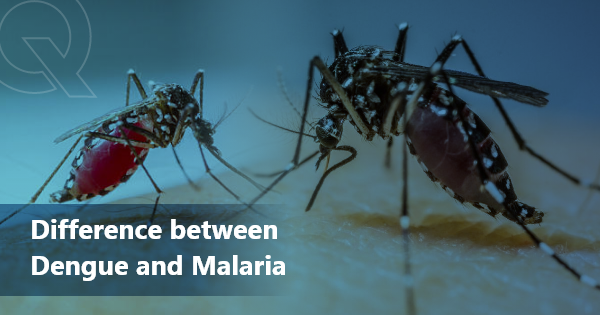Malaria and Dengue are big health problems in India, and they put many Indian lives in danger. According to the WHO, more than 435,000 people die from Malaria every year, and Dengue is one of the most dangerous mosquito-borne diseases worldwide.
India has been trying hard to reduce these diseases, especially in states like Odisha, which had a lot of Malaria deaths. They have been successful in lowering Malaria cases. However, Dengue cases are still going up by more than 30% each year, and people are dying from it all over the country.
Contents
Overview of Difference Between Dengue and Malaria
| Dengue | Malaria | |
| Causes | Malaria is caused by a single-celled parasite called Plasmodium, which is transmitted through the bite of infected female Anopheles mosquitoes. | Dengue, on the other hand, is caused by the Dengue virus, which is transmitted by Aedes mosquitoes when they bite an infected person and then bite another person. |
| Incubation Period | Malaria symptoms typically appear 8-25 days after the mosquito bite, depending on the type of Plasmodium parasite | Dengue symptoms usually manifest within 4-10 days after being bitten by an infected mosquito |
| Symptoms | Symptoms of Malaria include fever, chills, headaches, nausea, vomiting, muscle pain, and fatigue. In severe cases, it can lead to organ failure and spleen-related complications. | Dengue symptoms include high fever, severe headaches, fatigue, pain behind the eyes, swollen glands, and rashes. Dengue can also lead to a significant drop in white blood cell and platelet counts. |
| Treatment | Malaria can often be treated with antimalarial drugs prescribed by a healthcare provider. Severe cases may require hospitalization and intravenous treatment. | Dengue does not have a specific antiviral treatment, so medical care mainly focuses on managing symptoms. Intravenous fluids and rest are commonly used to help patients recover. |
| Prevention | To prevent Malaria, individuals can use insect repellents, sleep under insecticide-treated bed nets, and take prophylactic medications when traveling to high-risk areas. | Preventing Dengue involves eliminating mosquito breeding sites by not allowing stagnant water to collect in containers, using mosquito nets or repellents, and taking precautions to avoid mosquito bites. |
| Geographic Distribution | Malaria is widespread in tropical and subtropical regions, affecting many countries in Africa, Asia, and the Americas. | Dengue is also prevalent in tropical and subtropical areas, with a significant presence in parts of Asia, the Americas, and the Pacific. |
What is the difference between the symptoms of dengue and malaria?
Malaria and Dengue are both significant mosquito-borne diseases in India, with distinct characteristics.
Malaria is caused by the Plasmodium parasite, transmitted through Anopheles mosquitoes, and its symptoms include fever, chills, headaches, nausea, vomiting, and muscle pain. In severe cases, it can lead to organ failure and spleen-related symptoms.
On the other hand, Dengue is transmitted by Aedes mosquitoes. Its symptoms include high fever, fatigue, nausea, pain behind the eyes, swollen glands, and rashes. Dengue can cause a significant drop in white blood cell and platelet counts due to damage to the bone marrow and can lead to intense headaches from internal bleeding in severe cases. Dengue has been spreading rapidly and has recorded a substantial increase in cases in recent years, while Malaria has seen successful control measures in some regions.
What is the difference between the treatment of dengue and malaria?
The medicines for Malaria and Dengue are designed to fight the parasites or viruses in your blood caused by these diseases.
Severe Malaria may need special treatment given through a tube into your veins. Dengue doesn’t have a complete cure but can be managed with medicines and IV treatment, and sometimes a blood transfusion if you lose a lot of blood.
Most people get better from Malaria and Dengue with the right medicines and rest. To stay safe, avoid living in dirty areas, especially during rainy seasons in India. Don’t let water sit around, cover your food and water, use mosquito repellent or nets, and stay clean, especially if walking through flooded streets to reduce your risk of getting these dangerous diseases.
Frequently asked Questions
Q1:Which is harmful dengue or malaria?
A1:According to the World Health Organization (WHO), the annual death toll from Malaria has exceeded 435,000 people, while Dengue has been recognized as one of the most perilous and rapidly spreading mosquito-transmitted viral illnesses globally.
Q2:Can malaria be mistaken for dengue?
A2: Recent study cautions that in Africa, febrile illnesses are frequently misidentified as malaria. As an illustration, the research reveals that dengue fever is present in urban regions of Ghana but is frequently misdiagnosed as malaria. These findings may prompt a reassessment of malaria prevention efforts.





